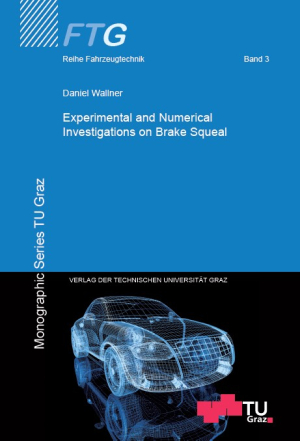In 1930 a survey regarding noise problems was conducted in New York City. At that time brake squeal was found to be one of the top ten noise concerns in New York. The problem has been the subject of over 80 years of intensive research with a view to its successful elimination. Brake squeal nevertheless remains a persistent problem, reducing the comfort of a vehicle and leading to high warranty costs for car manufacturers as customers are not willing to accept noisy brakes.
The present thesis examines different approaches to reduce brake squeal and discusses their advantages and disadvantages, as well as their possibilities and limitations. These considerations lead to the question of whether, by means of simulations and reproducible measurements, the influence of the different instability mechanisms can be determined and how the system could be changed to inhibit friction induced vibrations. To this end it is necessary to measure the resulting friction force of the pad as close as possible to the frictional contact of brake disc and pad. This necessitates the design of a complex measurement system and the development of an innovative smart friction force measuring sensor using strain gauges as presented in this thesis. The innovative complex measurement system introduced here enables fundamental research on brake squeal and facilitates new insights into this extensive issue.
Issue: paperback
ISBN: 978-3-85125-269-9
Scope: 158 pages
Language: Englisch
Release date: May 2013
Series: Monographic Series TU Graz / Reihe Fahrzeugtechnik, Issue 3
Out of stock!
In 1930 a survey regarding noise problems was conducted in New York City. At that time brake squeal was found to be one of the top ten noise concerns in New York. The problem has been the subject of over 80 years of intensive research with a view to its successful elimination. Brake squeal nevertheless remains a persistent problem, reducing the comfort of a vehicle and leading to high warranty costs for car manufacturers as customers are not willing to accept noisy brakes.
The present thesis examines different approaches to reduce brake squeal and discusses their advantages and disadvantages, as well as their possibilities and limitations. These considerations lead to the question of whether, by means of simulations and reproducible measurements, the influence of the different instability mechanisms can be determined and how the system could be changed to inhibit friction induced vibrations. To this end it is necessary to measure the resulting friction force of the pad as close as possible to the frictional contact of brake disc and pad. This necessitates the design of a complex measurement system and the development of an innovative smart friction force measuring sensor using strain gauges as presented in this thesis. The innovative complex measurement system introduced here enables fundamental research on brake squeal and facilitates new insights into this extensive issue.
These could also be of interest to you
-

Domenik Kaever, Christian Landschützer (Hrsg.)
Logistics at its best – Krisenfest mit Wissen und Innovation
OPEN ACCESS E-BOOK
Read more
MBSE in the Maritime Industry
€ 36.00 Add to cart
MBSE in the Maritime Industry
OPEN ACCESS E-BOOK
Read more
Marco Formentini, Nikola Suzic, Caterina Trevisan, Janpriy Sharma, Amila Omazic, Bernd Markus Zunk (Hrsg.)
Creating Effective Research Partnerships in Central and Eastern Europe to tackle Innovation and Sustainability Challenges in the Era of AI
OPEN ACCESS E-BOOK
Read more
- Catalog
- New releases
-
Open Access publications

- Enhanced e-books
-
Series
- Akademische Reden an der Technischen Universität Graz
- Arbeitshilfen für die Praxis
- Archiv und Bibliothek
- Betonkolloquium
- Buddhist Architecture in the Western Himalayas
- BWL Schriftenreihe
- Electrical Power Systems
- Fachbücher Planung und Bau
- Facts & Figures
- Festschriften TU Graz
- Forschungsreihe IBBW
- Forum Technik und Gesellschaft
- Geodesy
- Immersive Learning Research Network Conference; Workshop, short papers, poster
- Institut für Gebäudelehre Jahrbuch
- International Brain-Computer Interface (BCI) Meeting
- LM.VM.2014
- Logistik Werkstatt Graz
- Materialien zu Schwerpunkten am Institut für Gebäudelehre
- Mathematical Modelling of Weld Phenomena
- Monographic Series TU Graz
- Monographic Series TU Graz|Advanced Materials Science
- Monographic Series TU Graz|Computation in Engineering and Science
- Monographic Series TU Graz|Production Science and Management
- Monographic Series TU Graz|Railway Research
- Monographic Series TU Graz|Reihe Fahrzeugtechnik
- Monographic Series TU Graz|Schriftenreihe des Instituts Betonbau
- Monographic Series TU Graz|Structural Analysis
- Monographic Series TU Graz|Techno- und sozioökonomisch orientierte Betriebswirtschaft
- Monographic Series TU Graz|Technoökonomie und industrielles Management
- Monographic Series TU Graz|Timber Engineering & Technology
- November Talks
- Proceedings of the International Brain-Computer Interface
- Schriftenreihe des Instituts für Baubetrieb und Bauwirtschaft
- Schriftenreihe des Instituts für Straßen- und Verkehrswesen
- Schriftenreihe des Instituts für Wohnbau der TU Graz
- Schriftenreihe zur Wasserwirtschaft
- Science, Technology and Society online
- Seminarreihe Bauunternehmensführung
- Studien zur Architektur | TU Graz
- Textbook Series
- Transform Industry: Guiding the transformation of SMEs
- TU Graz Jahresbericht | Annual report
- TU Graz people
- TU Graz Research
- VKM-THD Mitteilungen; IVT-Mitteilungen ab Bd. 100
- Authors
- Sale
Contact
Verlag der
Technischen Universität Graz
Technikerstraße 4
8010 Graz, Österreich
UID(VAT) ATU 57477929
contact person
Gabriele Groß
Tel.: +43(0)316 873 6157
E-Mail: verlag [ at ] tugraz.at
Privacy Overview
Necessary cookies are absolutely essential for the website to function properly. These cookies ensure basic functionalities and security features of the website, anonymously.
| Cookie | Dauer | Beschreibung |
|---|---|---|
| cookielawinfo-checkbox-analytics | 11 months | This cookie is set by GDPR Cookie Consent plugin. The cookie is used to store the user consent for the cookies in the category "Analytics". |
| cookielawinfo-checkbox-functional | 11 months | The cookie is set by GDPR cookie consent to record the user consent for the cookies in the category "Functional". |
| cookielawinfo-checkbox-necessary | 11 months | This cookie is set by GDPR Cookie Consent plugin. The cookies is used to store the user consent for the cookies in the category "Necessary". |
| qtrans_front_language | 1 year | This cookie is set by qTranslate WordPress plugin. The cookie is used to manage the preferred language of the visitor. |
| viewed_cookie_policy | 11 months | The cookie is set by the GDPR Cookie Consent plugin and is used to store whether or not user has consented to the use of cookies. It does not store any personal data. |
| woocommerce_cart_hash | session | This cookie is set by WooCommerce. The cookie helps WooCommerce determine when cart contents/data changes. |
Analytical cookies are used to understand how visitors interact with the website. These cookies help provide information on metrics the number of visitors, bounce rate, traffic source, etc.
| Cookie | Dauer | Beschreibung |
|---|---|---|
| _pk_id | 1 year 27 days | Required for the operation of Matomo, an analysis tool that tracks and analyzes user behavior. |
| _pk_ref | 13 months | Required for the operation of Matomo, an analysis tool that tracks and analyzes user behavior. |
| _pk_ses | 30 minutes | Required for the operation of Matomo, an analysis tool that tracks and analyzes user behavior. |
Other uncategorized cookies are those that are being analyzed and have not been classified into a category as yet.
| Cookie | Dauer | Beschreibung |
|---|---|---|
| yt-remote-connected-devices | never | No description available. |
| yt-remote-device-id | never | No description available. |



